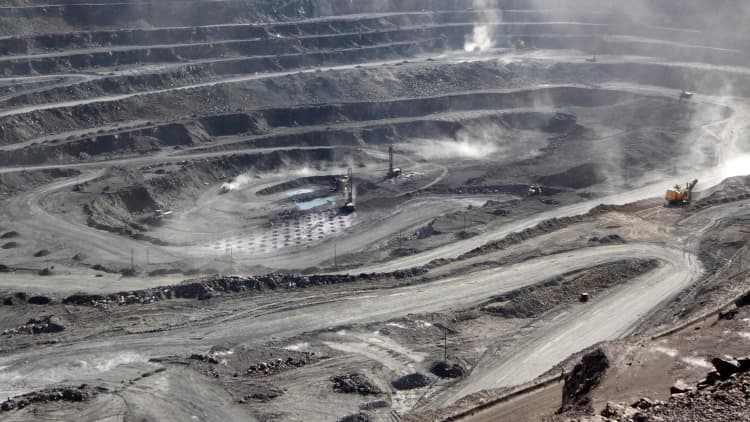Pictured is a stone with tungsten ore inside a mine in Germany operated by Saxony Minerals and Exploration.
Image Alliance | Image Alliance | Getty Images
BEIJING – China dominates the supply chain for many of the world’s critical minerals, but so far it has refrained from imposing sweeping restrictions on at least one: tungsten.
The metal is almost as hard as diamond and has a high energy density. This has made tungsten an important material in weapons, automobiles, electric car batteries, semiconductors, and industrial cutting machines. Chip makers such as Taiwan Semiconductor Manufacturing Company And Nvidia Both use metal.
“I don’t see any military threats regarding tungsten,” said Lewis Black, chief executive of Canadian company Almenti Industries, which is spending at least $75 million to reopen a tungsten mine in South Korea later this year.
“If you get too aggressive about diversification, (it becomes) biting the hand that feeds you,” he said, adding that “tungsten has always been a diplomatic metal.”
While the Biden administration raised tariffs on tungsten imports in May, China did not include the metal in new regulations late last week to strengthen its oversight of domestic rare earth production.
But China may not be too concerned, because the Chinese government has ignored the new tariffs… completely ignored them because the Chinese don't want tensions to escalate.
Louis Black
CEO of Almonte
“The tariffs were a warning, with Biden imposing tariffs on only three of the 25 strategic minerals China exports,” Black said.
“But China may not be too concerned, because the Chinese government has ignored the new tariffs, unlike in the past when it imposed restrictions on some rare earth exports. It has ignored it completely because the Chinese do not want tensions to escalate.”
Last month, when asked whether China would respond to the latest U.S. tariffs on tungsten, Chinese Commerce Ministry spokesman He Yadong did not announce any countermeasures. Instead, he called on the United States to remove the additional tariffs.
Commodity price reports and analysis firm FastMarkets noted earlier this year that China has cut national production quotas for tungsten mines due to environmental restrictions.
Diversifying away from China
However, Black expects his company to benefit from growing efforts to diversify its revenue streams away from China. Almenti claims that an upcoming mine in South Korea has the potential to produce 50% of the world’s tungsten supply outside of China.
Demand for non-Chinese tungsten is already growing.
“We are seeing in the US and Europe that they are demanding a China-free supply chain from their suppliers,” said Michael Dornhoefer, founder of metals consultancy Independent Supply Business Partner.
The US REEShore Act — or the Rare Earths Energy Reserve Recovery and Security Act of 2022 — bans the use of Chinese tungsten in military equipment starting in 2026, while the European Commission last year extended tariffs on imported Chinese tungsten carbide for another five years, Almonty Industries noted in a report.
Last month, the Committee on U.S.-CPC Strategic Competition announced the formation of a new working group on U.S. critical minerals policy.
Tungsten prices rise
Expectations of rising demand and limited supplies of tungsten have pushed prices to multi-year highs, although they have eased in recent weeks.
Dornhofer said in an interview in late May that he had also noticed Chinese buyers increasing their purchases of tungsten.
“Since the beginning of this year, they have not only asked for Western focus, but they have bought in large quantities, paying more than Western companies are willing to pay. This will certainly make a big difference,” he said.


In January, US research firm MacroOps said: “We are approaching a tipping point in tungsten supply. The US will rapidly run out of tungsten stocks and turn from a net seller to a net buyer over the next 12 to 18 months.”
The U.S. Department of Commerce's Bureau of Industry and Security did not immediately respond to CNBC's request for comment on this story.
There are only six companies in the United States that have the capacity to produce tungsten, Brandon Bello, head of investment research at Macro Ops, told CNBC in an email. The United States has not produced tungsten domestically since 2015, meaning future U.S. supplies will have to come from abroad, he added.
He said the company doesn’t own any tungsten-related stock, but he’s personally looking for ways to access the physical commodity. There are no futures contracts for tungsten.
Other Tungsten Players Head to South Korea
China controls more than 80% of the tungsten supply chain, although domestic production costs are rising as mines age, according to Argus, pointing to Chinese imports of the metal from North Korea, Central Africa and Myanmar.
“This represents an opportunity for projects outside of China,” Mark Seddon, director of consulting and analytics at Argus, said in a webinar on June 28.
Other non-Chinese companies in the tungsten supply chain are turning to South Korea.
In February, IMC Endmill, a subsidiary of Warren Buffett's IMC Group, signed an agreement with the Daegu city government to invest 130 billion won ($93.6 million) in a tungsten powder manufacturing facility, according to a local news report.
IMC Group did not immediately respond to CNBC's request for comment.


China's dominance of global supply chains for critical minerals has been built over several decades.
Dornhofer noted that efforts to produce tungsten outside China have been stalled for years, including plans for a mine in New Brunswick, Canada, that would have significantly increased global tungsten production capacity.
All of these projects have been on the table for 20 years, he said. “When people tell you they’re going to be up and running in two or three years, it’s a question of whether you believe them. On the other hand, the tungsten is in the ground. It’s still there.”
Almenti claims to be the largest producer of tungsten outside China, and currently operates mainly in Portugal and Spain. The soon-to-open mine in Sangdong, South Korea, was closed in the 1990s.
After the mine reopens later this year, Black expects his company will account for only 7% or 8% of the world's tungsten supply.
“We do not exclude any Chinese, and we do not intend to do so,” he said.
“If we’re going to produce 30% to 40% now, I’m picking a fight with China, and that wouldn’t be smart.”
